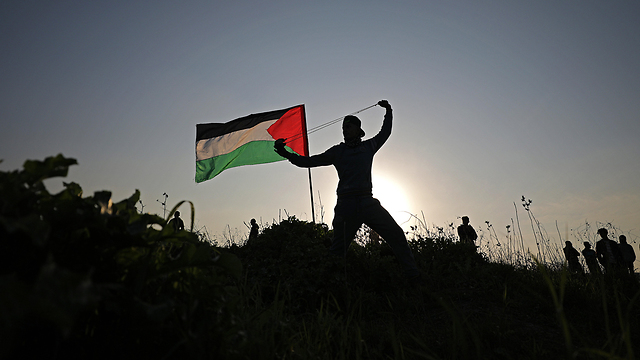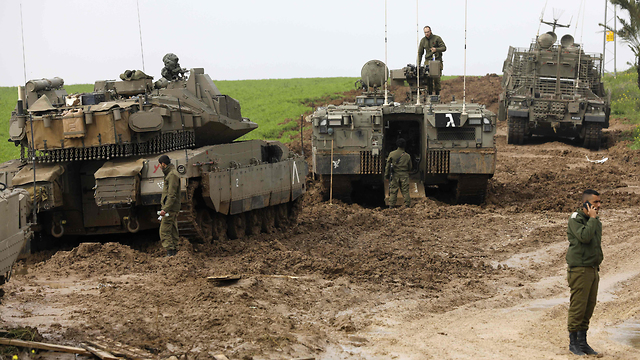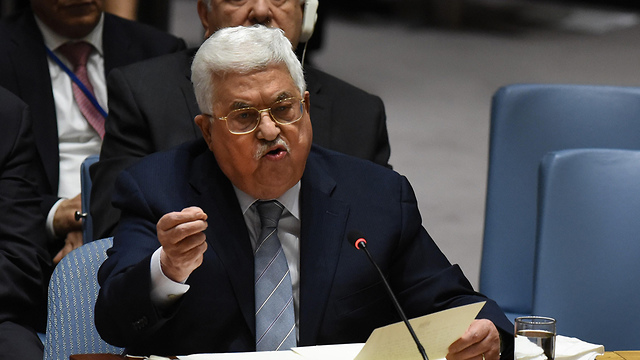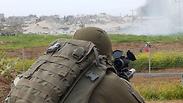
Decade of relative calm is behind us
Analysis: The Military Intelligence Directorate has been warning for over a year now that the territories are headed to a major violent outburst. The old order in the Palestinian society is crumbling before Israel’s eyes, and the ‘great return march’ along the Gaza border in late March could set the region on fire.
The events in the West Bank, in east Jerusalem and in the Gaza Strip are not seasonal warnings and terror attacks related to Nakba Day, Palestinian Prisoners’ Day, our Independence Day or Land Day. Neither are they a response to the Trump initiative and to the American recognition of Jerusalem as Israel’s capital.
The strategic warning the Military Intelligence Directorate has been pointing to for over a year now is being realized before our eyes: The relatively calm decade in the territories is behind us. The major violent conflict between the Palestinian street and the Palestinian leadership and between the Palestinian street and Israel is just looking for an opportunity.
The IDF’s intelligence and operational list of priorities is also changing accordingly. Up until now the northern front and the Iranian involvement were seen as a clear priority and marked as the main threat. Now, the Palestinian arena is being given the same weight as the northern threat.
Intelligence researchers are pointing to three anchors that have maintained a relatively low level of violence in the Palestinian arena in the past decade: The Israeli security organizations’ prevention abilities, the security coordination with the Palestinian Authority, and enabling a reasonable fabric of life for the Palestinian citizen in the West Bank. These anchors, which are interdependent, have worn out. Israel has no more “beads” to hand out to the Palestinians to gain calm and time.
The “lone-wolf attacks,” which marked the strategic change about two years ago, are no longer lone-wolf attacks, and the state of mind on the Palestinian street indicates that the old order has been undermined, both in Gaza and in the West Bank. We are seeing a regular trend of disintegration looking for a dramatic, external event to blow up and bring about anarchy.
The relative calm, interrupted by an occasional terror attack, is deceiving. Even the Hamas rule is under an internal threat—not to mention Palestinian President Mahmoud Abbas, who has reached the end of his political road.

The “great return march” which is being organized in the Gaza Strip in recent weeks includes not only mass processions from the strip to the fence. Appetite comes with eating, and today they’re already talking about similar plans in the West Bank and among Israel’s Arabs too, and about processions from the Jordanian border and from the Lebanese border as well.
The main performance is scheduled to begin at the end of March. The IDF—mainly the Southern Command—is preparing to deal with tent cities along the Gaza border and with thousands of people marching towards dozens of points along the border, in an attempt to cross it. In the West Bank, they’ll try to enter settlements. The preparations are for riots, but it’s perfectly clear that if these plans are carried out—there will be casualties. Mass processions endangering soldiers cannot be stopped with teargas alone.
This might be the event that will set the ground on fire. The Palestinian security organization won’t help here. It’s a hazardous event which has the potential of spinning out of control. The current protests on the Gaza border, during which explosive devices are planted on the fence, are just the preview aimed at warming up and gradually leading to the main performance of the masses’ outburst.

One of the steps being taken by Israel today to postpone and reduce the outburst of this volcano is an attempt to build a coalition with the United States and seven Arab countries that would create a different reality of life in the strip. The coordinator of government activities in the territories, Major-General Yoav Mordechai, attended emergency meetings for the reconstruction of Gaza in Cairo and in Washington in recent days, and on Monday he is attending a donor countries’ conference in Brussels. The goal is to quickly introduce infrastructure projects in the strip to prevent a humanitarian disaster, which has the potential of blowing up the entire Middle East. And it’s all happening without the Palestinians.
The situation is so explosive, that Israel and the US—with the Arab countries’ consent—are adopting a new strategy ignoring the whims of the Palestinian Authority in Ramallah and indirectly strengthening Hamas’ governance.
Abbas, who understands he is being pushed aside, is doing everything in his power to put a spoke in the Gaza reconstruction’s wheels. He understands that there is a precedent here, an attempt to solve the Israeli-Palestinian problem with quiet consent from the Arab countries and without the Palestinians, and that calls for an explosion too.
Israel’s achievements in dealing with the tunnels are immeasurably important. But the rammer in the West Bank, the stabber in Jerusalem or the Palestinian who plants explosive devices on the Gaza border are signs of a deeper, much more threatening process.


















